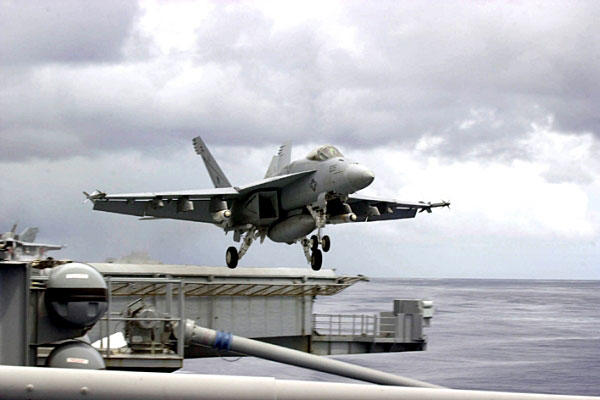The current U.S. air campaign in Iraq is being paid for from supplemental war funding that a top general has likened to "crack cocaine" for budget planners.
The Overseas Contingency Operations money, which supplements the regular Defense Department budget, "has been sort of like crack cocaine" for the military, Army Gen. John F. Campbell said at a roundtable discussion with Pentagon reporters.
"When you get it, you don't want to get off it," said Campbell, who will take over later this month from Marine Gen. Joseph Dunford as the overall U.S. commander in Afghanistan.
At the Pentagon on Monday, Army Lt. Gen. William C. Mayville, the Pentagon's operations chief, said he could not give a cost estimate on the current campaign of airstrikes and airdrops in Iraq. A defense official later said that the money would come from OCO funding.
On Saturday, in response to questions on Iraq funding, President Obama said that "we are acting within the budget constraints" of the sequestration cost-cutting process and "right now, at least, I think we are OK" on paying for the airstrikes and humanitarian relief.
"If and when we need additional dollars to make sure that American personnel and American facilities are protected, then we will certainly make that request," Obama said.
The OCO budget, sometimes called the supplemental budget, is in addition to the base budget of $496 billion submitted by the Defense Department for fiscal 2015. The Defense Department has been relying upon OCO money to fund the wars in Iraq and Afghnistan apart from the base budget.
After months of delay, Deputy Defense Secretary Robert Work and the White House Office of Management and Budget last month submitted to Congress an OCO request for FY 2015 amounting to $58.6 billion.
Work noted that the $58.6 billion was $26.7 billion less than the $85.3 billion enacted by Congress for OCO in the current fiscal year. The request was also $100 billion less than the $159 billion OCO request from four years ago.
Work said the current OCO request "reflects a continued downward trajectory" in the OCO budget following the wars in Iraq and Afghanistan. However, several members of the House Armed Services Committee questioned whether OCO has become a fallback fund for items and projects not included in the Defense Department's base budget.
In way of explanation, two defense budget experts aligned themselves with Gen. Campbell's "crack cocaine" analogy.
"I agree it's the crack cocaine of the budget world," Todd Harrison, of the Center for Strategic and Budgetary Assessments, said of the OCO budget.
"It's a loophole," he said. "We're addicted to it" as a way to get around the restrictions of the base budget and the mandatory cuts of the Budget Control Act's sequester process.
The OCO funding was the first time since World War II that major conflicts have been funded outside the base budget, said Gordon Adams, a Stimson Center and American University analyst.
"It's a safety valve for the constraints of the BCA [Budget Control Act]. They've been on this since 2003," Adams said of the Defense Department. "Once the department discovered the heroin, they started putting other things in the mix" besides the wars in Afghanistan and Iraq, such as funding for the formation of the Army's Brigade Combat Team structure.
Congressional appropriators have been dipping into OCO for operations and maintenance functions that should be in the base budget, Adams said.
"The White House has discovered this too. They're all putting it on the OCO tab. Everybody has discovered the crack cocaine," he said.
-- Richard Sisk can be reached at Richard.Sisk@monster.com































